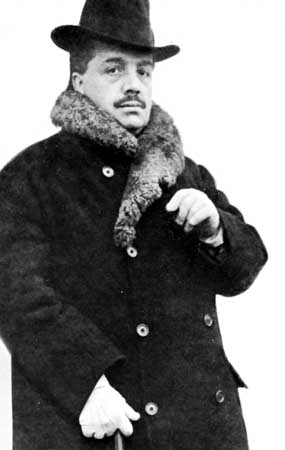 I posted last month about the new aria for Danse Russe that Paul Moravec and I are writing. It’s for the character of Sergei Diaghilev, the founder of the Ballets Russes. In it he describes how it feels to be an impresario who cannot create a work of art on his own.
I posted last month about the new aria for Danse Russe that Paul Moravec and I are writing. It’s for the character of Sergei Diaghilev, the founder of the Ballets Russes. In it he describes how it feels to be an impresario who cannot create a work of art on his own.
I thought you might enjoy reading the text, which I wrote in a hotel room in Sarasota a few weeks ago and which Paul is now setting to music in his studio in Manhattan.
* * *
DIAGHILEV (speaking) And there they go. Full of excitement, full of ideas, sure of themselves–and sure they don’t need me. You heard them. (Imitating STRAVINSKY) “He thinks he knows everything–but he knows nothing.”
(Singing) No one will ever know
What happens before the curtain rises.
All the people see is the show,
And no one will ever know
The struggles and the fears
Of the man everyone despises.
My work, my life,
They’ll slip through the fingers
Of memory,
And no one will ever know
What I did,
What I do,
How I make them all come through.
(With mock grandiosity, quoting himself) “I am the impresario,
The man behind the scenes.
I put the players in the pit,
The dancers on the stage…”
(Wistfully) I dream of things,
Beautiful things
That no one in the world
Has ever done or seen.
They flash before my sleeping eyes
Like pictures on a screen–
But not quite clear enough,
Never, ever clear enough,
And then…
Only then…
He gestures to the left, then to the right. STRAVINSKY and NIJINSKY appear from opposite sides of the stage, carrying sticks to which marionette strings are attached. The strings are attached to their bodies. They hand the sticks to DIAGHILEV, who starts to manipulate the two men.
(Briskly) Do this! Do that!
Let’s try a different hat!
The pas de deux is boring
And the clarinets are flat!
The steps are trite,
The tune’s not right,
Fix everything
And fix it now–
We open tonight!
He hands the sticks back to STRAVINSKY and NIJINSKY, who exit.
I cannot dance,
I cannot sing,
I cannot write the simplest melody–
But I can hire a hall
And bring men together
To paint all the pictures
That flash through my mind
In the silence of the night–
But not quite clear enough,
Never, ever clear enough.
Without them, I’m nothing.
Without me, they’re…
(Speaking, with a touch of irony) Something.
But something different,
Maybe better, maybe worse–
But different.
(Singing) And no one will ever know
What I did,
What I do,
How I make them all come through,
How I help them to see
What is new,
What is true.

 Mrs. T and I are in Melbourne, Florida, this morning, sitting on the balcony of a room in a beachfront hotel and listening contentedly to the waves. A little later today we’ll drive back to Winter Park, where I have three days’ worth of work to do. Among other things, I’ve finished outlining the fifth chapter of my Duke Ellington biography, and it’s just about time to start writing.
Mrs. T and I are in Melbourne, Florida, this morning, sitting on the balcony of a room in a beachfront hotel and listening contentedly to the waves. A little later today we’ll drive back to Winter Park, where I have three days’ worth of work to do. Among other things, I’ve finished outlining the fifth chapter of my Duke Ellington biography, and it’s just about time to start writing.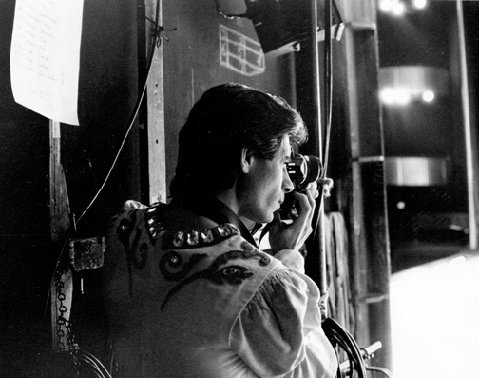 For more information about the screening, go
For more information about the screening, go 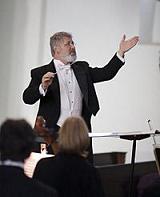 On Saturday I return to Winter Park, where I’ll be conducting a public interview with John Sinclair, the artistic director and conductor of Winter Park’s Bach Festival Society concerts. John is leading a performance of Beethoven’s Fifth Symphony and Mozart’s C Minor Mass on Sunday afternoon, and I’ll be chatting with him about the experience of rehearsing and conducting the program. Our joint appearance is at Rollins College’s Bush Auditorium at 7:30 p.m.
On Saturday I return to Winter Park, where I’ll be conducting a public interview with John Sinclair, the artistic director and conductor of Winter Park’s Bach Festival Society concerts. John is leading a performance of Beethoven’s Fifth Symphony and Mozart’s C Minor Mass on Sunday afternoon, and I’ll be chatting with him about the experience of rehearsing and conducting the program. Our joint appearance is at Rollins College’s Bush Auditorium at 7:30 p.m.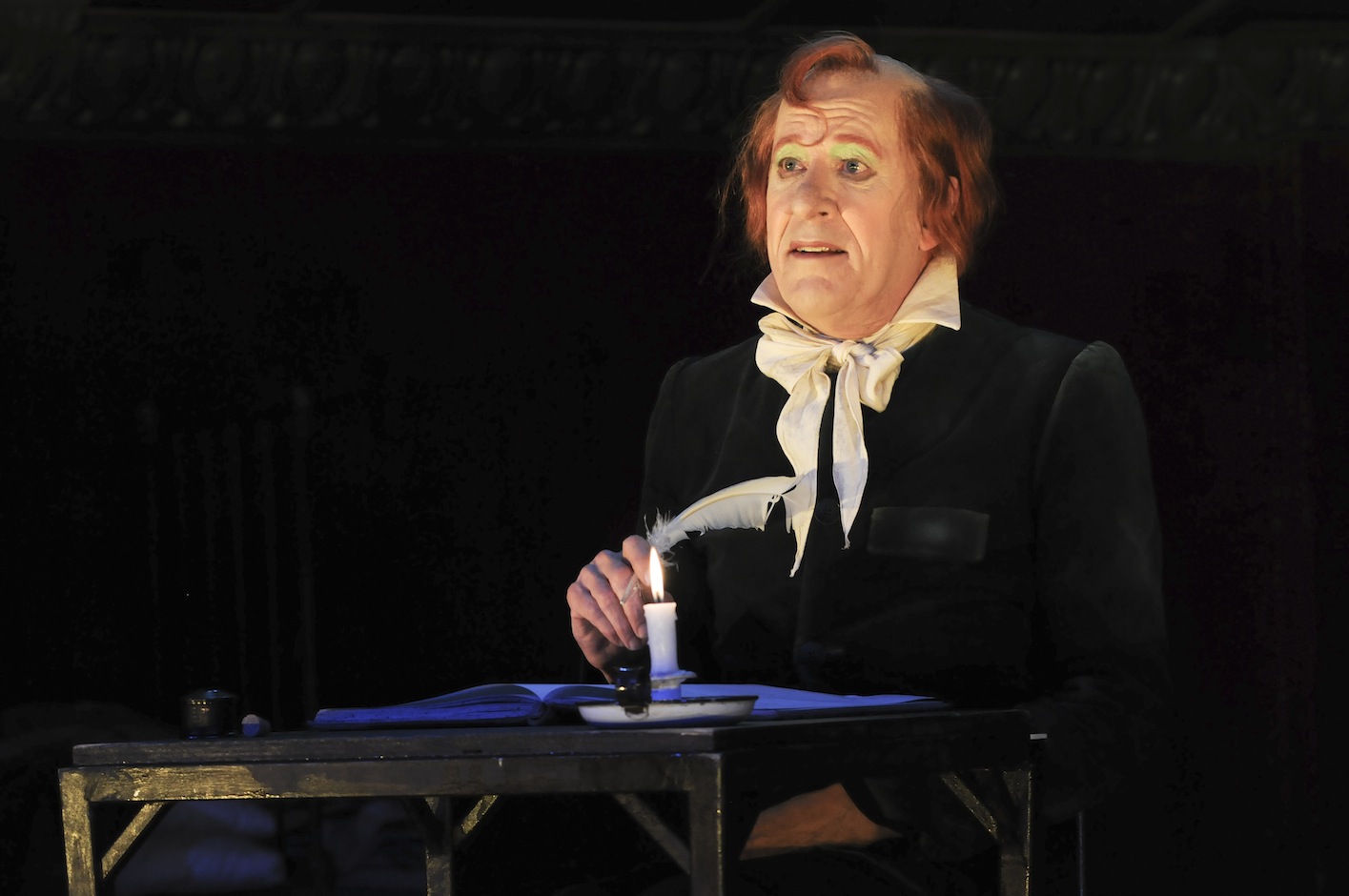 Everyone knows what Geoffrey Rush has been up to lately, but when he’s not giving Oscar-nominated performances in movies about stuttering kings, he can frequently be seen on the stage. His first such appearance in New York, in the 2009 Broadway revival of Eugène Ionesco’s “Exit the King,” won him a Tony. Now he’s back in town, playing another man at the end of his rope. “The Diary of a Madman” is David Holman’s stage version of Nikolai Gogol’s 1835 short story about an obscure civil servant who goes mad and proclaims himself to be the King of Spain. No one will be surprised to hear that Mr. Rush, who won an Oscar playing a schizophrenic in “Shine,” gives a spectacularly flamboyant performance as Poprishchin, a Clerk of the Ninth Grade who spends his days trimming quill pens and dreaming of glory. But in spite of all the excitement that Mr. Rush is stirring up at the BAM Harvey Theater, I can’t say that I found “The Diary of a Madman” to be convincing, much less moving.
Everyone knows what Geoffrey Rush has been up to lately, but when he’s not giving Oscar-nominated performances in movies about stuttering kings, he can frequently be seen on the stage. His first such appearance in New York, in the 2009 Broadway revival of Eugène Ionesco’s “Exit the King,” won him a Tony. Now he’s back in town, playing another man at the end of his rope. “The Diary of a Madman” is David Holman’s stage version of Nikolai Gogol’s 1835 short story about an obscure civil servant who goes mad and proclaims himself to be the King of Spain. No one will be surprised to hear that Mr. Rush, who won an Oscar playing a schizophrenic in “Shine,” gives a spectacularly flamboyant performance as Poprishchin, a Clerk of the Ninth Grade who spends his days trimming quill pens and dreaming of glory. But in spite of all the excitement that Mr. Rush is stirring up at the BAM Harvey Theater, I can’t say that I found “The Diary of a Madman” to be convincing, much less moving.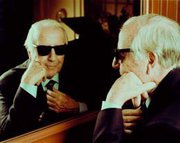 Today’s Wall Street Journal “Sightings” column is a tribute to George Shearing. Here’s an excerpt.
Today’s Wall Street Journal “Sightings” column is a tribute to George Shearing. Here’s an excerpt.